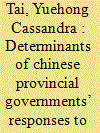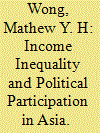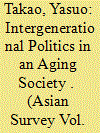|
|
|
Sort Order |
|
|
|
Items / Page
|
|
|
|
|
|
|
| Srl | Item |
| 1 |
ID:
186406


|
|
|
|
|
| Summary/Abstract |
Scholars who study governance in authoritarian countries have long highlighted the importance of fiscal capacity and pressure from the central government in determining the responsiveness and policy changes of subnational governments. However, policy orientation is also important in shaping how subnational governments react to a crisis. Using provincial governments’ responses during the 2018 Chinese vaccine scandal, I find strong evidence that an emphasis on public health, as well as early responses by neighboring provinces, increased the likelihood of a quick response. Moreover, issue salience minimized the direct effect of pressure from the national government. An additional paired case study of the provinces of Hubei and Hunan shows that the importance accorded by the provincial government to public health policy was implemented at the sub-provincial level through China’s one-level-down cadre management system; it also may explain Hubei’s delay in responding to COVID-19 at an early stage.
|
|
|
|
|
|
|
|
|
|
|
|
|
|
|
|
| 2 |
ID:
186407


|
|
|
|
|
| Summary/Abstract |
Formal and informal modifications to the US-Japan Alliance have expanded the value the Alliance operational structure delivers in support of US and Japanese national and combined naval activities in Southeast Asia. This article analyzes how the Alliance now serves as an increasingly powerful force multiplier which magnifies the capabilities, efficiency, and impact of the two allies’ naval activities in Southeast Asia. Unlike previous studies on the role of the United States or Japan in the region, it focuses on the evolving functionality of the Alliance operational structure. The article systematically discusses how the evolving nature of the Alliance operational structure is enabling it to provide expanded support for Southeast Asian maritime security in five areas: basing, combined operations, partnerships and access, extra-regional coordination, and cooperative capacity-building. Those evaluations enable discussions of prospects for US and Japanese initiatives in Southeast Asia.
|
|
|
|
|
|
|
|
|
|
|
|
|
|
|
|
| 3 |
ID:
186404


|
|
|
|
|
| Summary/Abstract |
This paper examines the impact of income inequality on political participation in Asia. Both conventional conflict theory and relative power theory suggest that inequality affects political participation, but they predict opposite directions. In this paper, I argue that the effects of inequality on participation depend on the type of political action: radical or institutional. To substantiate this claim, I analyze four Asian Barometer Survey waves from 2001 to 2014. Using nested models, I find that the effect of income inequality is conditional: it is positively associated with violent activities; has no significant correlation with less radical forms of protest; and is negatively associated with institutional actions, namely voting and persuading others to vote. While the effect does not depend on income level, regime type matters for certain activities. Political capacity, the perception of powerlessness, and trust in government are other potential factors in the relationship.
|
|
|
|
|
|
|
|
|
|
|
|
|
|
|
|
| 4 |
ID:
186408


|
|
|
|
|
| Summary/Abstract |
Japan’s population is aging faster than any other nation’s, producing many more older voters, and raising an important question related to intergenerational equity. Do older voters prioritize their short-term self-interest at the expense of other generations? I find that the older voters in Japan are surprisingly less self-interested—even less than similarly aged voters in other advanced economies—in maximizing their benefits as service consumers to the detriment of younger voters. This behavior of older voters in Japan is an enigma. To stimulate dialogue about an equitable and sustainable welfare system, I consider a set of structural and institutional factors that may, individually or collectively, help explain the apparently less self-interested preferences of older voters in Japan.
|
|
|
|
|
|
|
|
|
|
|
|
|
|
|
|
| 5 |
ID:
186405


|
|
|
|
|
| Summary/Abstract |
How does economic hardship during a crisis affect people’s evaluation of the political leadership? In this paper, we investigate how the negative impact of an exogenous event like COVID-19 interacts with other important phenomena which influence leadership approval, such as partisanship, political trust, and satisfaction with democracy. Using a nationally representative survey in Indonesia (N = 1,200), we show that economic hardship does not uniformly undermine leadership approval; rather, this effect is moderated by partisanship and by satisfaction with the functioning of democracy. Of the people who voted for President Jokowi in the 2019 election, those who faced economic hardship gave him lower levels of approval than those who were better-off. At the same time, those satisfied with the functioning of democracy in the country reported higher approval even if they faced economic hardship. We discuss the policy implications of our findings and provide a theoretical framework for the mechanisms that affect leadership approval during a crisis.
|
|
|
|
|
|
|
|
|
|
|
|
|
|
|
|
|
|
|
|
|